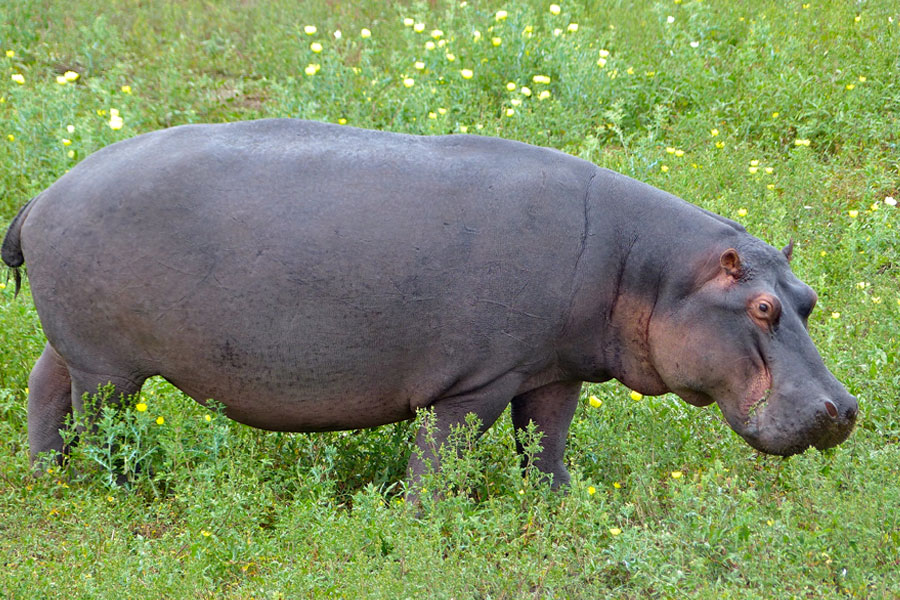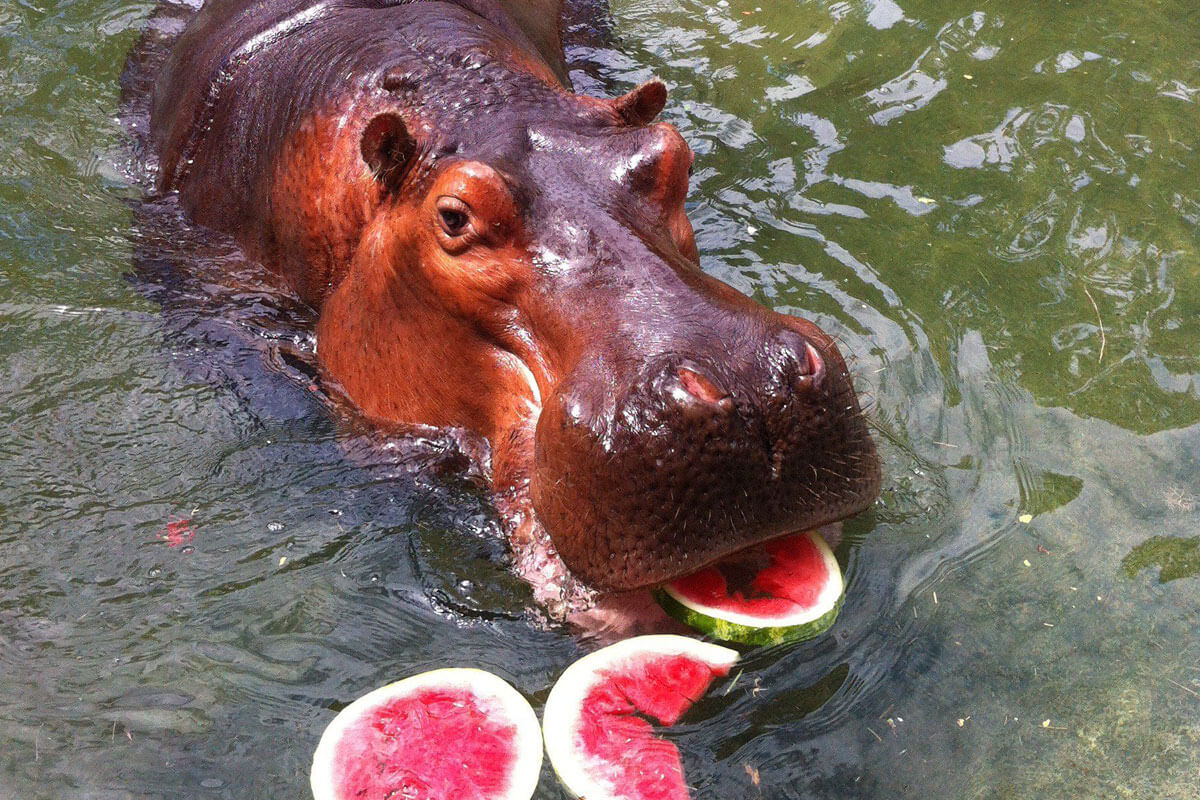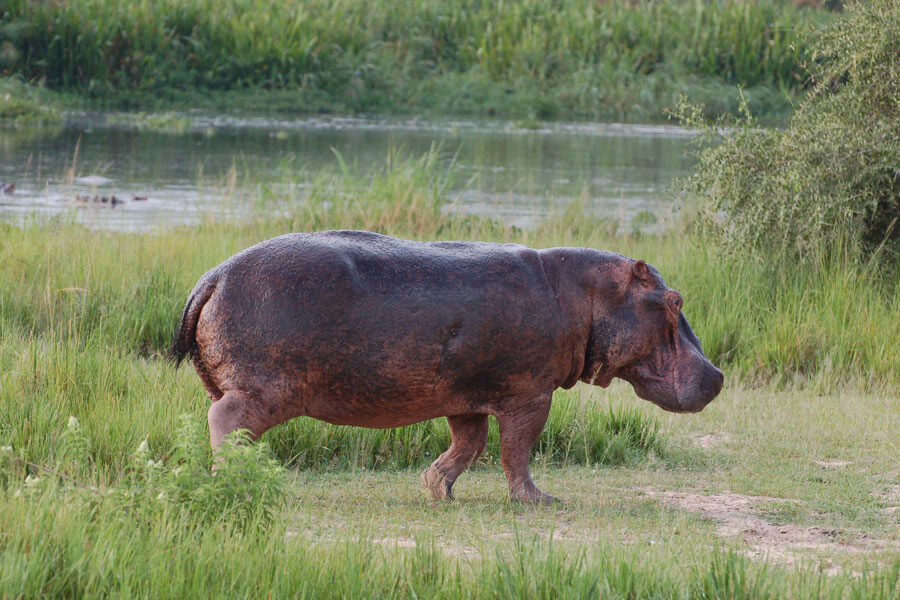
Due to their large size, the question of what hippos eat always comes up. The hippo's sharp teeth might make you think that a hippo is a predator that hunts other animals for food but hippos are herbivores that eat vegetation.
In this article, we'll look at what hippos eat - and go even deeper to look at the habits, adaptations, and amount of food they need daily.
What Hippos Eat In The Wild
In the wilderness, a Hippo's diet is mainly made up of the common savannah short grass that they graze on every night. Grass makes up the largest percentage of a hippo's diet and the rest is made up of some fruits, young shoots, and reeds.

In the daytime, hippos might come out of the water for a few minutes to feed on the grasses near the river or lake. These patches of grass near the water are referred to as "hippo lawns" but hippos move several kilometres from the river to feed at night.
Hippos do all their feeding on land and therefore do not eat any aquatic plants.
Related article: Where you can find hippos in the wild
Do Hippos Eat Watermelon In The Wild?
Similar to the zoo, the hippopotamuses in the wild can also eat watermelon, but they do not. There is no watermelon in the wild.
While you are in the wild, you are not allowed to feed the animals in the wilderness - including hippos. This is for safety and health reasons for both you and the hippos.
On any safari, you will be briefed about not feeding the wild animals, and you can not take watermelon for the hippos. Not following this strict rule can result in prosecution that ends in huge fines, prison time or both.
What Hippos Eat At The Zoo

Since the zoo is different from the natural habitat of a hippopotamus, the feeding is different. Hippos in the zoo are fed on herbivore pellets, alfalfa, watermelons, lettuce, mixed vegetables and some fruits.
Like other zoo animals, hippos are closely monitored and their diet is adjusted to make sure that they get all the necessary nutrients needed for their survival.
Do Hippos Eat Meat?
Going by their most observed habit and their stomach structure, scientific research maintains that hippos are herbivores. However, a few incidences have been observed of hippos eating meat from the carcass of another animal or even a dead hippo.
These cannibalistic incidents are very few and in between and therefore considered anomalies. Some of the strong theories suggest that hippos are driven to cannibalism when some nutrients are scarce and can be found in dead animals.
The first record of hippos eating meat was in Zimbabwe's Hwange National Park in 1995. Since then, the other incidents total up to fewer than a dozen.
How Much Do Hippos Eat?
To maintain their big bodies, hippos eat an average of 40 kilograms of grass daily. This feeding is done in about 4 to 6 hours of the night when the savannah sun is not scorching down on their sensitive skin.

Hippo's Digestive System
The stomach system of the hippopotamus is well adapted for its feeding habits. Unlike other herbivores, a hippo's stomach has 3 chambers that each have a different digestive purpose.
Additionally, unlike other herbivores like cattle and African buffalos, hippos do not chew their cud.
The digestive system of a hippo is very long and very efficient in deriving the necessary nutrients from the grasses they eat. This is why hippos can eat for a short period at night and spend the entire day time hibernating in the water without getting too hungry.
Feeding Habits Of Hippos
The most obvious habit of the hippopotamus is feeding at night. This is because they are avoiding the scorching African sun that would hurt their sensitive skin.
While a hippo's skin is 2 inches thick, hippos have no sweat glands and the hot sun is tough on them.
During the night, hippos are solitary feeders and often feed individually except for the younger calves that go with their mothers. This is unlike their more social setting in the water where they stay in big groups with a dominant male.

Final Thoughts
While hippos have intrigued humans since the time of the Ancient Egyptians, the sight of a hippo yawning in the river is exciting and somehow threatening.
While their bodies, name, mouth, and teeth are all very interesting, a hippo's digestive system is unlike any other animal. This is why they can utilize food in a way that an elephant could never dream of.
As nocturnal grazers, it is unlikely that you will see many hippos eating beyond the river bank but when you do, you should remember that their stomach system is one of the strangest and most efficient of big animals.
